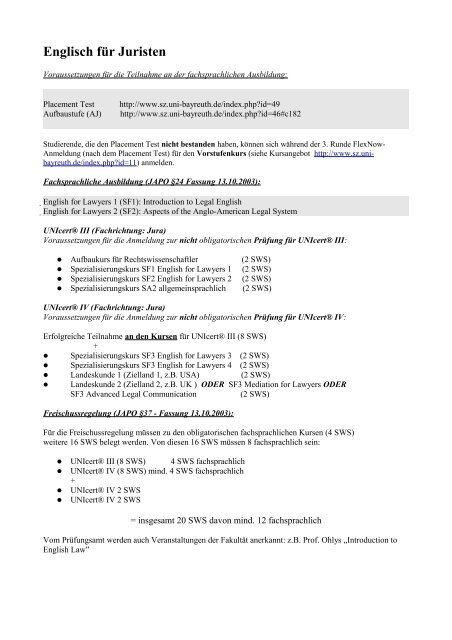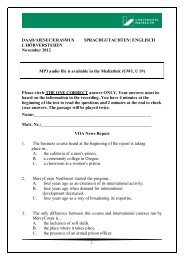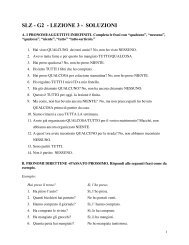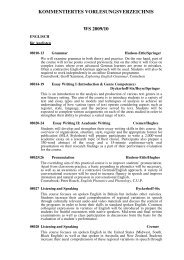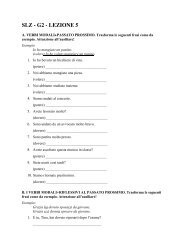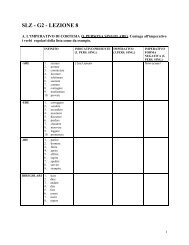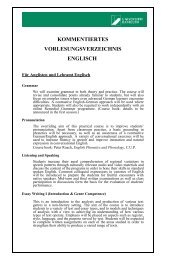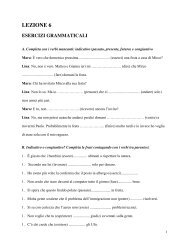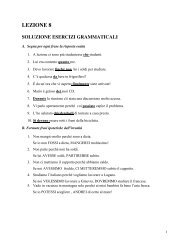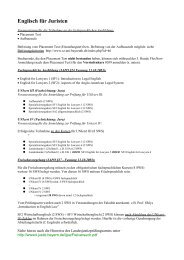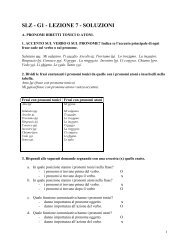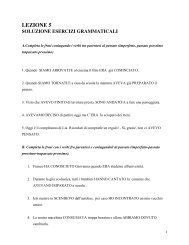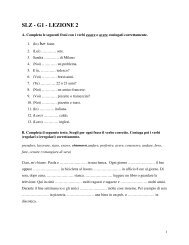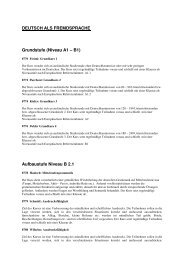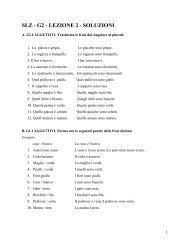Englisch für Juristen - Sprachenzentrum der Universität Bayreuth
Englisch für Juristen - Sprachenzentrum der Universität Bayreuth
Englisch für Juristen - Sprachenzentrum der Universität Bayreuth
You also want an ePaper? Increase the reach of your titles
YUMPU automatically turns print PDFs into web optimized ePapers that Google loves.
<strong>Englisch</strong> für <strong>Juristen</strong><br />
Voraussetzungen für die Teilnahme an <strong>der</strong> fachsprachlichen Ausbildung:<br />
Placement Test<br />
Aufbaustufe (AJ)<br />
http://www.sz.uni-bayreuth.de/index.php?id=49<br />
http://www.sz.uni-bayreuth.de/index.php?id=46#c182<br />
Studierende, die den Placement Test nicht bestanden haben, können sich während <strong>der</strong> 3. Runde FlexNow-<br />
Anmeldung (nach dem Placement Test) für den Vorstufenkurs (siehe Kursangebot http://www.sz.unibayreuth.de/index.php?id=11)<br />
anmelden.<br />
Fachsprachliche Ausbildung (JAPO §24 Fassung 13.10.2003):<br />
English for Lawyers 1 (SF1): Introduction to Legal English<br />
English for Lawyers 2 (SF2): Aspects of the Anglo-American Legal System<br />
UNIcert® III (Fachrichtung: Jura)<br />
Voraussetzungen für die Anmeldung zur nicht obligatorischen Prüfung für UNIcert® III:<br />
Aufbaukurs für Rechtswissenschaftler (2 SWS)<br />
Spezialisierungskurs SF1 English for Lawyers 1 (2 SWS)<br />
Spezialisierungskurs SF2 English for Lawyers 2 (2 SWS)<br />
Spezialisierungskurs SA2 allgemeinsprachlich (2 SWS)<br />
UNIcert® IV (Fachrichtung: Jura)<br />
Voraussetzungen für die Anmeldung zur nicht obligatorischen Prüfung für UNIcert® IV:<br />
Erfolgreiche Teilnahme an den Kursen für UNIcert® III (8 SWS)<br />
+<br />
Spezialisierungskurs SF3 English for Lawyers 3 (2 SWS)<br />
Spezialisierungskurs SF3 English for Lawyers 4 (2 SWS)<br />
Landeskunde 1 (Zielland 1, z.B. USA) (2 SWS)<br />
Landeskunde 2 (Zielland 2, z.B. UK ) ODER SF3 Mediation for Lawyers ODER<br />
SF3 Advanced Legal Communication<br />
(2 SWS)<br />
Freischussregelung (JAPO §37 - Fassung 13.10.2003):<br />
Für die Freischussregelung müssen zu den obligatorischen fachsprachlichen Kursen (4 SWS)<br />
weitere 16 SWS belegt werden. Von diesen 16 SWS müssen 8 fachsprachlich sein:<br />
UNIcert® III (8 SWS) 4 SWS fachsprachlich<br />
UNIcert® IV (8 SWS) mind. 4 SWS fachsprachlich<br />
+<br />
UNIcert® IV 2 SWS<br />
UNIcert® IV 2 SWS<br />
= insgesamt 20 SWS davon mind. 12 fachsprachlich<br />
Vom Prüfungsamt werden auch Veranstaltungen <strong>der</strong> Fakultät anerkannt: z.B. Prof. Ohlys „Introduction to<br />
English Law”
Course Descriptions<br />
Developing Reading Comprehension in Legal English<br />
(Vorstufe)<br />
This course focuses on the needs of Law students who have failed to reach the required standard at the Placement Test<br />
administered by the <strong>Sprachenzentrum</strong>.<br />
Participants will study a corpus of authentic texts relating to law and legal practice as a means of enhancing their<br />
reading comprehension skills. Supplementary exercises and class activities will allow students to broaden their<br />
vocabulary and improve their grammatical accuracy. Students who achieve an overall grade of 2.3 or higher will be<br />
exempted from the Placement Test.<br />
Successful participation is in the course is recognized as part-fulfilment of the requirements stipulated in JAPO §24<br />
Fassung 13.10.2003. Note, however, that it is NOT a UNIcert®® course.<br />
Aufbaukurs für Rechtswissenschaftler<br />
Upper Intermediate Communication Skills for Lawyers<br />
(Aufbaustufe)<br />
Promoting greater accuracy and variety of expression are the principal goals of this course which focuses on assisting<br />
students to develop a wi<strong>der</strong> vocabulary base (including legal lexis) for effective spoken and written communication.<br />
Conversational English drawn from a variety of practical and professional situations will be used to enhance students'<br />
fluency and confidence in their use of idiomatic English. Exercises based on audio materials will help participants<br />
improve their listening skills. Relevant points of grammar will be revised as students 'rediscover' rules of structure and<br />
usage for themselves. Students will also read a corpus of texts on current legal issues and write brief commentaries in<br />
response; the emphasis, however, will be on oral competence and active participation.<br />
Note that participation in this course is NOT recognized as part-fulfilment of the JAPO §24 requirements.<br />
English for Lawyers 1 Introduction JAPO §24 (SF1)<br />
The aims of this course are to provide an introduction to the English legal system and to develop the language<br />
skills relevant to this area of study. The course will focus on central features of the legal system including the common<br />
law and the development of equity, the doctrine of judicial precedent, the constitution and human rights, the enactment<br />
process and statutory interpretation, the courts and the role of the jury, the education and training of barristers and<br />
solicitors.<br />
English for Lawyers 2 Aspects of the Anglo-American Legal Systems JAPO §24 (SF2)<br />
This course builds on the competencies acquired by participants in the introductory English for Lawyers 1course.<br />
Emphasis will be placed on consolidating and expanding students’ command of Legal English, enabling them to read<br />
case reports, prepare case briefs, and articulate their opinions regarding key legal concepts and current issues in Anglo-<br />
American Contract, Tort and Criminal law. Each unit is centred around one or more landmark cases.<br />
English for Lawyers 3<br />
(SF3)<br />
This course builds on the competencies acquired by participants in the introductory English for Lawyers 1 and<br />
English for Lawyers 2 courses; it aims to prepare students for professional activity in an international business<br />
environment by equipping them with the necessary linguistic skills and relevant knowledge of the Anglo-<br />
American legal system.<br />
The course will focus on the following areas:<br />
Business organisations<br />
• types of business vehicles (including SE companies); registration procedures and documents<br />
• issue of shares and debentures; sharehol<strong>der</strong> rights<br />
• corporate insolvency and corporate rescue<br />
• fiduciary duties<br />
Contract law<br />
• formation of contracts<br />
• terms<br />
• vitiating factors
Competition law<br />
• European Community competition law<br />
• merger control regulations in the UK & USA<br />
Business resources<br />
• intellectual property (patent law, registered designs, law of copyright, trade marks)<br />
• data protection<br />
Students will be expected to research, retrieve, study and discuss the relevant statutory and case law and apply<br />
this to actual/sample cases; they will be asked to read and interpret specimen documents and to formulate legal<br />
'opinions' for potential 'clients'. They will also be required to present legal arguments in simulation exercises<br />
(moot courts) and analyse court rulings, thus relating the principles of business law to real-world scenarios.<br />
Students will also be required to read and discuss a selection of relevant press articles. Particular attention will be<br />
paid to expanding participants' legal and business vocabulary and enhancing their powers of logical expression,<br />
while consolidating their general communicative competence and rhetorical skills.<br />
English for Lawyers 4<br />
This course complements, but can be taken before, or concurrently with, English for Lawyers 3. The course will<br />
have a similar format to English for Lawyers 3 and will focus on the following areas:<br />
Business and the law of tort<br />
• tortious liability<br />
• specific torts relevant to business (negligence, defective goods and services, economic torts)<br />
• liability of professionals (lawyers, accountants and auditors)<br />
Criminal liability in business<br />
• misdescription of goods and services<br />
• corporate malpractice: selective disclosure and insi<strong>der</strong> trading;<br />
• US Sarbanes-Oxley Act 2002 and UK fraud control<br />
Consumer protection<br />
• statutory approaches to consumer protection; consumer protection institutions<br />
• codes of practice; advertising standards<br />
Employing labour<br />
• contract of employment<br />
• discrimination; rights and remedies on dismissal<br />
• vicarious liability<br />
Mediation for Lawyers<br />
(SF3)<br />
(SF3)<br />
This course will focus on an increasingly important part of the Anglo-American legal system, that of alternative dispute<br />
resolution (ADR). The escalating cost of court proceedings has served as impetus for potential litigants to resort to ADR<br />
and, in particular, to mediation – the use of a neutral third party to assist disputants in reaching compromise<br />
agreements. Mediation currently plays a key role in the settlement of disputes between business partners in the<br />
international arena.<br />
Students will be encouraged to apply the legal and linguistic knowledge they have acquired in previous /English<br />
for Lawyers/ courses as they explore the theoretical issues involved in ADR/mediation. Special emphasis will be<br />
placed in the course on contract renegotiation. Participants will have the opportunity to enhance their oral<br />
(negotiation) skills in simulation exercises based on authentic case material.<br />
A variety of follow-up writing assignments will help to consolidate lexical and grammatical competence.<br />
Advanced Legal Communication<br />
(SF3)<br />
As a successful lawyer you will have to be a persuasive communicator both on paper and before an audience. Whether<br />
writing an opinion or letter, negotiating on behalf of a client, or making a presentation in court, you will need to know<br />
how to communicate the best factual and legal arguments to support your case. Working with case law and studies from<br />
international business, this course will help you to develop the tools and techniques you will need to be able to argue<br />
most effectively in English in various legal contexts. Skills developed will include: identifying the key facts and points<br />
of law in a given case, building your winning arguments, dealing with counter-arguments, effective presenting on paper,<br />
convincing face-to-face (the art of advocacy), negotiation and persuasion tactics.


